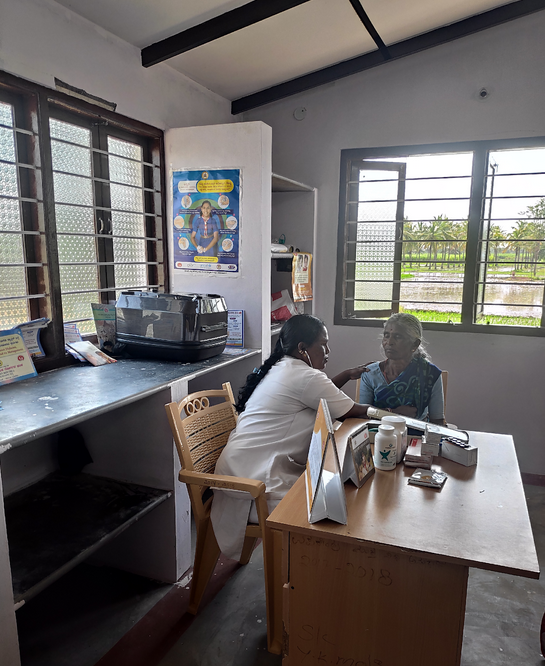Background
Gumballi is a village located in Chamrajanagar District in the State of Karnataka. In this region, every Primary Health Centre (PHC) has 5 Sub Centres (SC), however the Gumballi PHC did not have sufficient number of sub centres under it. With the initiative of Karuna Trust (an organization running government health centres in a public-private partnership), permission was obtained to construct 3 Sub Centres. One such centre (in YK Mole), was chosen to pilot climate responsive, energy efficient guidelines developed by SELCO Foundation. The land was allocated by the panchayat with discussions held with various stakeholders including the ANM who is from a tribal community in BR Hills (nearby village in Chamarajanagar). Earlier, she had to travel from her village to the SC which was very arduous and far due to which she had rented a small room in a village close to YK Mole. She had to pay rent and transportation costs from her minimal salary and faced security issues.

Built Environment Solution
The Sub Centre was designed with 2 rooms keeping in mind the requirements - an examination room which is big enough to conduct emergency deliveries, as well as a room with a desk for the ANM to administer patients. The rooms were constructed where people could seek counsel, and be comfortable in. A spacious courtyard was designed for people to use as waiting space as well as to conduct monthly immunization drives which is a critical part of the ANM’s work. It was also designed keeping in mind the alternate use of the SC as a community space where the villagers could meet and have awareness sessions and meetings. A staff quarter was built separately next to the sub centre for the ANM to reside in with a separate toilet, room, and hall space. There is a collapsible gate which has been made to ensure safety for the ANM as well as to administer medication from her quarters at night, if required. The clinic and her residential quarters are completely solar powered with lights and fans ensuring that she is not affected by frequent power cuts observed in the region.

Layout to Incorporate Natural Lighting and Ventilation
A U-shaped layout with a central courtyard space, improves cross ventilation. The windows were aligned to the wind direction. The courtyard further acts as a heat sink which creates higher pressure area due to heat and allows hot air to escape. The window wall ratio was designed for 22.5 percent, nearly 75 percent of the indoor spaces are lit by natural light, hence saves energy during much of the day.

Overhangs and Projections
Large overhangs on the east façade and exterior shading systems block solar radiation and promote entering of cool air during the summer. During the winter months, the low altitude of the winter sun warms the facades and thermal lag resulting in warmer nights indoors.

Material and Construction Technology
The main characteristics of the building envelope are highly-efficient walls and roof which allow delayed heat to transfer into the building. Structure designed has high thermal resistance, especially important in the coldest and hottest month. Insulated Roofing using Bison Board and colour coated sheets having air cavity in between as an insulation and double roofing which delays heat gain through roofing
Learnings
Post the lockdown, Bhagya, the ANM has been conducting door to door surveys every day checking villagers for fever, cold, headaches and maintaining a register. She starts her check-up drive in the morning and has been going from village to village by foot, covering about 100 households across 5-6 kms every day. Over the past one month she has covered 600 households. She returns to the Subcentre by 5-6 PM and keeps the clinic open till 11 PM, catering to cases from villagers like knee pain, joint pain, headache cases visiting her. Despite of using the clinic only in the evenings during the lockdown period, the outside temperature has been very high as it is peak summer. The clinic has been cool and comfortable for the ANM as well as the patients with plenty of air circulation, as she keeps all the windows open. The examination room is being used for immunizations and the courtyard as a waiting area for patients. Regular check ups for blood pressure, fevers, heachaches and other ailments are being conducted in the examination room. According to the ANM, having demarcated spaces has helped maintain physical distancing protocols and in a comfortable manner for the patients. She makes the patients sit in specific areas with adequate distancing and has made it compulsory for visitors to wear masks.
Post Intervention scenario
If the subcenter did not have comfortable living conditions, she would have had to live in a nearby village instead- and cover over 20 kms by foot every day to cover the same number of villages she is able to cover now. Currently, she covers 6 km every day, and is also able to keep the clinic open till late night
"With patients coming and visiting only in the night due to COVID-19 duties, it is very convenient for me to be living next door. The clinic is very comfortable and cool at all times and I remain unaffected by power cuts at odd hours due to having a solar connection."
Bhagya
Auxiliary Nurse Midwife, YK Mole Subcentre
Impact
Constant Energy Available due to Solar: The area is rife with power cuts ranging from 10-12 hours at times. With the monsoons, approaching the possibility of extended power cuts are high as well. With the sub centre and the living quarters being solar powered, Bhagya is able to use lights and fans at all times increasing safety and comfort. With patients now visiting the clinic post sundown up till 11 PM, the need for constant power is imperative. Other sub centres in the region which are not solar powered or have efficient lighting, have bills ranging from INR 700-800 per month. Bhagya receives a bill of INR 100-200 per month due to her use of the water pump.
Independent Toilets: With separate toilets in the clinic and the living quarters, it is very convenient for the ANM as the patients would not have to use the toilet in her quarters. Earlier when she lived in the village nearby, she had no toilet in her living space and had to go outdoors to relieve herself.
Safety and Security: Many ANMs who were posted here before Bhagya had asked for transfers due to uncomfortable and improper living conditions. Currently during COVID-19, Bhagya is able to cover screening of about 100 households per day and keep the clinic open till late night for emergency cases. This would not have been possible earlier.
